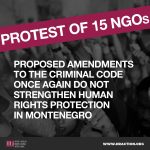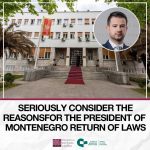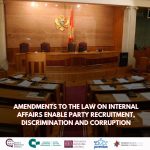23/1/2015 – Zvjerinjak – Where there is will, there is a way – even in Montenegro
23/01/20152/2/2015 – AMENDMENTS TO THE LAW ON NATIONAL SECURITY AGENCY INTOLERABLY EXPAND EXISTING AUTHORITIES OF AGENCY DIRECTOR
03/02/201529/1/2015 – PROPOSED AMENDMENTS TO THE LAW ON NATIONAL SECURITY AGENCY CONTRARY TO THE CONSTITUTION OF MONTENEGRO AND EUROPEAN CONVENTION FOR THE PROTECTION OF HUMAN RIGHTS AND FUNDAMENTAL FREEDOMS
Proposed amendments to the Law on National Security Agency expand the competences of the employees of that institution through a “backdoor”, contrary to the provisions of the Constitution of Montenegro and the European Convention for the Protection of Human Rights and Fundamental Freedoms.
We call upon the members of the Parliament of Montenegro to file amendments to the proposed changes of the Law on National Security Agency, in order to protect human rights from arbitrariness of any individual.
The Government proposed amendments to the Law on National Security Agency that, amongst other issues, envisage that all legal persons are obliged to allow access to all their information through direct insight by an employee of the Agency who presents official identification. Based on that, every single employee of the National Security Agency can arbitrarily and in an unlimited manner access all personal information of citizens, including medical records, banking data and all the other information that are in possession of other legal entities in the state. It is thereby envisaged for every legal entity, including media, NGO sector, and even political parties to be impelled to allow every employee of the National Security Agency that has an identification to oversee all their information, registers and other documentation, without any limitation or measure of protection.
At the same time, the proposed law does not prescribe the grounds for suspicion that someone perpetrated an offense, so that it could intervene with his/her rights.
Moreover, legal entities do not have any possibility of protection if they believe that an employee with official identification should not access their registers or collection of data they own. No mechanism of complaint has been prescribed, which could postpone conducting of the verbal order of an employee of the National Security Agency and access to data.
No mechanisms of control and checking on why an employee of National Security Agency is accessing these data and for what purpose is prescribed by this law.
The Constitutional court of Montenegro concluded that gathering of this kind of information enjoys constitutional protection of inviolability of confidentiality and it determined that inviolability of this data can be avoided solely if the court decides so, for purposes of conducting of criminal proceeding or for security reasons of Montenegro. Namely, in its decisions from July last year which were made based on the MANS’ initiative, the Constitutional court of Montenegro determined as unconstitutional provisions of the Criminal procedure Code under which the police gathered telephone listings without court order from the provider of telecommunication services. The Constitutional court determined that such prescription is contrary to the Constitution and the European Convention for Protection of Human Rights and Fundamental Freedoms, as well as that such kind of authorisation which allows arbitrary acting of police, without court review, is not in accordance with standards of the European court. In that respect, the Constitutional court called upon the case Rotary vs. Romania, where the European court expressed its view that control of these measures has to respect the values of democratic society, as faithfully as possible, especially the rule of law.
“Even though the court admits that intelligence agencies can exist in democratic society in a legitimate way, it reiterates that the authorisations of secret surveillance of citizen can be tolerated, based on the Convention, only when it is strictly necessary for the protection of democratic institutions.”
The Constitutional court indicated that protection of individual from unauthorised intervention in his/her privacy is proclaimed by the international law as a fundamental human right which enjoys full legal protection and that only the court can allow exceptions from secrecy defined by the provisions of the Constitution.
The Constitutional court took such a position in its decisions in which it determined that the provisions of the Criminal Procedure Code under which the police was allowed to gather the so called listings of telephone communications from mobile operators were unconstitutional. The proposed Law provides even greater authorisations to employees of the National Security Agency, who could gather all other data that any other body or legal person gathers, and they could do so arbitrarily and without any control in relation to all persons, without any limitations.
Therefore, we invite all MPs from all political parties to submit amendments to proposed changes of the Law on National Security Agency and secure respect of the rights of citizens guaranteed by the Constitution and international conventions.
Tea Gorjanc-Prelević, Human Rights Action
Stevo Muk, Institute Alternative
Daliborka Uljarević, Centre for Civic Education (CCE)
Vanja Ćalović, MANS







 English
English